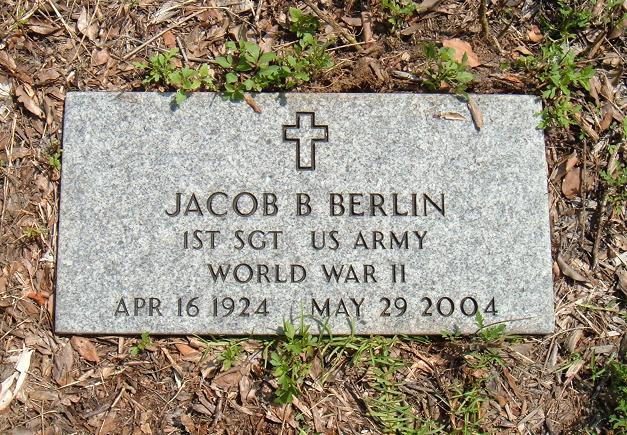Rev. Dr. Jacob Boris Berlin
Episcopal Priest / Counselor AUGUSTA, Ga. - The Rev. Dr. Jacob Boris Berlin died peacefully Saturday evening, May 29, 2004, in Augusta, Georgia. Fr. Berlin was preceded in death by his sister, Sara Berlin Amatniek. She is survived by her husband, Ernest Amatniek and their two daughters, Kathie Amatniek and Joan Cindy Amatniek. Fr. Jack Berlin was born on April 16, 1924, in Brooklyn, New York, to Alexander Berlin and Martha Aranow Berlin. He lived in New York City most of his younger life. His father and father 's brother, Harry Berlin, left Russia's Czarist oppression in the early 1900's to come to New York City. Harry Berlin and his wife, Anna, had one daughter, Beatrice, who married Dr. L. Joseph Stone, a professor at Vassar College. They are survived by three daughters, Deborah Stone, Susannah Stone Eldridge and Miriam Stone Leavitt. After the onset of World War II, Fr. Berlin enlisted in 1943, becoming an expert radio operator. Recruited by the Office of Strategic Services for clandestine operations, he received training for and became a Jedburgh. After initial training, his group sailed on the Queen Mary for England. There, they were formed into three-man teams to fight with the French Resistance forces. On his team, Team Ammonia, were Lt. Benton MacDonald Austin of Savannah, Ga., and Lt. Raymond LeCompte of France. From Algeria, they were to fly to southern France in the Perigord region in time to stop the advancement of the 2d SS Panzer division toward Normandy and D-Day. Due to weat her delays, they were twice sent back to Algeria but finally, on June 10, 1944, the plane dropped them from 800 feet onto a field near the town of Ste. Nathalene, France. For the next two weeks, the three men were hidden in a secret wall in the home of the Laquieze family. When the Germans left that area, the men began their mission of helping to train the local boys and older men in sabotage. Together, they were successful in delaying the Panzer's advance toward Normandy by several weeks. Then, with the French work at an end, the men were asked to volunteer for their next mission within the OSS. Jack Berlin chose a secret mission to China where he was ultimately taken as a Japanese prisoner-of-war. He never wanted to talk about his treatment by them, but he was lucky and did survive. On a later mission, he found that other Americans in camps there were beheaded by the Japanese. Fr. Berlin was named an Honorary Citizen of Sarlat, France, during one of his many happy returns to Ste. Na thalene with his wife. Forty-three years after the war ended, he finally received one of France's highest honors, the Croix de Guerre, originally awarded just after the war though France had been unable to present it to him until 1988 in Washington, DC. In 1945, he received Mention in a Despatch for Distinguished Service by the King's Order. First Sergeant Jack Berlin's military decorations and citations include: the Army Good Conduct Medal, the American Theater Ribbon, the World War II Victory Ribbon, the European/African/Middle Eastern Theater Ribbon with two Bronze Stars and Arrowhead, the Asiatic/Pacific Theater Ribbon with two Bronze Stars, and the Parachutist's Badge. His battles and campaigns included Normandy, Northern France, the Rhineland, the China Defensive and the China Offensive. After the war, life became much more peaceful. He enrolled at Vassar College for two years where he met his future wife, and then he transferred to Harvard College for two years, graduating in 1 950 with a major in Biology. In 1951, he graduated from the University of North Carolina at Chapel Hill with a Masters in Public Health. He then was hired by the Near East Foundation to work in improving the health of villagers in Iran. His three sons were born during this time. While living in Teheran, he became friends with the American Baptists, who introduced him to the Book of John in the New Testament, the American Presbyterians, who impressed him with their educational and social services to the Iranians, one Congregationalist minister who lent him books, and he was especially influenced by the Anglican missionaries in Isfahan, Iran.
Published in The Augusta Chronicle on May 31, 2004

PRIVATE CITIZENS SUPPORTING AMERICA'S HERITAGE
American
War Memorials Overseas, Inc.
War Memorials Overseas, Inc.
Berlin Jacob Boris
Name:
Jacob Boris Berlin
Rank:
Serial Number:
Unit:
Office of Strategic Services (OSS)
Date of Death:
2004-05-29
State:
Cemetery:
Palmetto Cemetery, Brunswick, Georgia
Plot:
Row:
Grave:
Decoration:
Comments:
